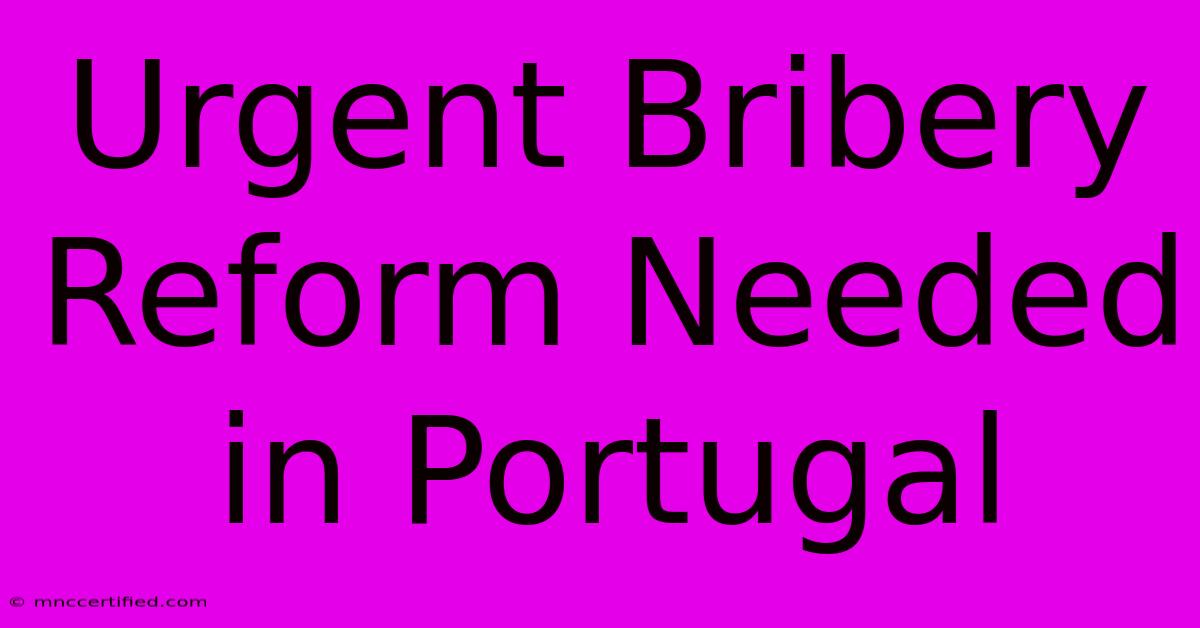Urgent Bribery Reform Needed In Portugal

Table of Contents
Urgent Bribery Reform Needed in Portugal: A Call for Transparency and Accountability
Portugal, a nation known for its rich history and vibrant culture, faces a significant challenge: combating endemic corruption. While strides have been made, the persistent issue of bribery demands urgent and comprehensive reform. This article explores the urgent need for stronger anti-bribery measures in Portugal, examining the current landscape, highlighting the detrimental effects of corruption, and proposing concrete steps towards a more transparent and accountable future.
The Current State of Bribery in Portugal
While Portugal has implemented anti-corruption legislation, enforcement remains a significant hurdle. The OECD's Anti-Bribery Convention and the European Union's anti-corruption initiatives provide a framework, but their effectiveness is hampered by several factors. These include:
- Limited resources allocated to anti-corruption agencies: Understaffing and underfunding hinder effective investigations and prosecutions.
- Lack of whistleblower protection: Fear of retaliation prevents individuals from reporting corrupt practices. This lack of whistleblower protection significantly hinders the uncovering of bribery schemes.
- Slow judicial processes: Lengthy investigations and trials allow corrupt individuals to evade justice and perpetuate their activities.
- Perceived impunity: A culture of impunity, where corrupt individuals are rarely held accountable, further emboldens bribery and corruption. This perception of impunity needs to be urgently addressed.
These shortcomings create a climate where bribery can flourish, affecting various sectors, from public procurement to the private sector.
The Detrimental Effects of Bribery
The consequences of widespread bribery are far-reaching and detrimental to Portugal's economic and social development. Specifically:
- Economic damage: Bribery distorts markets, discourages foreign investment, and undermines fair competition, ultimately impacting economic growth. This economic damage represents a significant drain on resources.
- Erosion of public trust: Corruption erodes public trust in institutions, leading to disillusionment and social unrest. This erosion of public trust weakens democratic processes.
- Reduced efficiency of public services: Bribery can lead to inefficient allocation of resources and poor quality public services. This reduced efficiency impacts citizens directly.
- Undermining the rule of law: Widespread bribery undermines the rule of law, creating a system where influence and connections trump justice. The undermining of the rule of law is a critical threat to a stable society.
Proposed Reforms for a Brighter Future
Addressing the bribery crisis in Portugal requires a multifaceted approach encompassing several key reforms:
Strengthening Anti-Corruption Agencies
- Increased funding and staffing: Adequate resources are crucial for effective investigation and prosecution.
- Enhanced training and expertise: Equipping agencies with the necessary skills to tackle sophisticated bribery schemes.
- Improved technology and data analysis: Utilizing modern tools to identify and track suspicious activities.
Protecting Whistleblowers
- Robust legal framework: Ensuring comprehensive protection against retaliation for reporting corruption.
- Confidential reporting mechanisms: Establishing secure and anonymous channels for reporting suspected bribery.
- Incentives for whistleblowers: Rewarding individuals who provide crucial information leading to successful prosecutions.
Streamlining Judicial Processes
- Reducing case backlogs: Implementing measures to expedite investigations and trials.
- Specialized anti-corruption courts: Establishing dedicated courts with expertise in handling corruption cases.
- Increased judicial independence: Protecting judges from political influence and ensuring their impartiality.
Promoting Transparency and Accountability
- Open public procurement processes: Ensuring transparency in government contracts and public spending.
- Strengthening asset declaration laws: Requiring public officials to disclose their assets to prevent conflicts of interest.
- Promoting a culture of ethics and integrity: Educating citizens and public officials on the importance of ethical conduct.
International Collaboration
- Sharing best practices: Learning from other countries with successful anti-corruption initiatives.
- Joint investigations: Collaborating with international organizations to tackle transnational bribery schemes.
Conclusion: A Path Towards Integrity
Tackling bribery in Portugal requires a concerted and sustained effort from the government, civil society, and the private sector. By implementing these reforms and fostering a culture of transparency and accountability, Portugal can pave the way towards a brighter future, characterized by integrity, justice, and sustainable development. The urgent need for bribery reform cannot be overstated; its success is vital for Portugal's future prosperity and its standing on the world stage. This call for transparency and accountability is not just a plea, but a necessity.

Thank you for visiting our website wich cover about Urgent Bribery Reform Needed In Portugal. We hope the information provided has been useful to you. Feel free to contact us if you have any questions or need further assistance. See you next time and dont miss to bookmark.
Featured Posts
-
Denmark Vs Spain Match Uefa Nations League
Nov 16, 2024
-
Portugal Vs Poland Live 2 0 Uefa Nations
Nov 16, 2024
-
Late Dunk By Collins Secures Jazz Win
Nov 16, 2024
-
Kosovo Match Fan Behavior Guidelines
Nov 16, 2024
-
Sheridans Landman Billy Bob Thornton In Lead Role
Nov 16, 2024